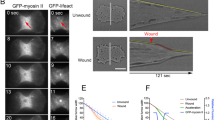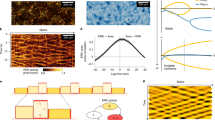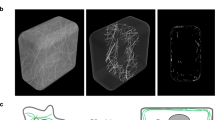Abstract
SEVERAL types of experiment which have been interpreted as evidence for the control of cell division by the action of diffusion boundary layers can equally well be interpreted as being due to the action of mechanical effects. The pumping experiment, and wounding experiments1 have all been interpreted as evidence that increasing the rate of exchange of metabolites between cell and medium stimulates the cell cycle and in particular the transition G0 to S. However, there is already much observational evidence that suggests that mechanical stress may lead to increased division2–4. The pumping and wounding5 experiments might mechanically stress cells so that it is timely to carry out an experiment which distinguishes between the effects of mechanical tension and the effects of changed diffusion rates. We provide experimental evidence that mechanical tension may stimulate the cell cycle in vertebrate cells.
This is a preview of subscription content, access via your institution
Access options
Subscribe to this journal
Receive 51 print issues and online access
$199.00 per year
only $3.90 per issue
Buy this article
- Purchase on Springer Link
- Instant access to full article PDF
Prices may be subject to local taxes which are calculated during checkout
Similar content being viewed by others
References
Stoker, M. G. P. Nature 246, 200–203 (1973).
Billingham, R. E. & Medawar, P. B. J. Anat. 89, 114–123 (1955).
Cullen, B. M. & Harkness, R. D. Q. Jl exp. Physiol. 53, 33–42 (1968).
Abercrombie, M. Symp. Soc. exp. Biol. 11, 235–254 (1957).
Zetterberg, A. & Auer, G. Expl Cell Res. 62, 262–270 (1970).
Curtis, A. S. G. & Varde, M. J. natn. Cancer Inst. 33, 15–26 (1964).
Curtis, A. S. G. J. natn. Cancer Inst. 26, 253–268 (1961).
Rogers, A. W. Techniques of Autoradiography (Elsevier, Amsterdam, 1969).
Todaro, G. J., Lazar, G. & Green, H. J. Cell comp. Physiol. 66, 325–333 (1965).
Burk, R. R. in Control of Proliferation in Animal Cells (eds Clarkson, B. & Baserga, R.) (Cold Spring Harbor Laboratory, New York, 1974).
Maroudas, N. G. Cell 2, 217–219 (1974).
Stoker, M., O'Neill, C., Berryman, S. & Watson, V. Int. J. Cancer 3, 683–693 (1968).
Maroudas, N. G. Expl Cell Res. 74, 337–342 (1973).
Wessells, N. K. et al. Science 171, 135–143 (1971).
Maroudas, N. G. Expl Cell Res. 81, 104 (1973).
Hartley, H. O. Commun. pure appl. Math. 8, 47–72 (1955).
Whittenberg, B. & Glaser, L. Nature 272, 821–823 (1978).
Folkman, J. & Moscona, A. Nature 273, 345–349 (1978).
Author information
Authors and Affiliations
Rights and permissions
About this article
Cite this article
CURTIS, A., SEEHAR, G. The control of cell division by tension or diffusion. Nature 274, 52–53 (1978). https://doi.org/10.1038/274052a0
Received:
Accepted:
Published:
Issue Date:
DOI: https://doi.org/10.1038/274052a0
This article is cited by
-
A Mathematical Modelling Study of Chemotactic Dynamics in Cell Cultures: The Impact of Spatio-temporal Heterogeneity
Bulletin of Mathematical Biology (2023)
-
Mathematical formulation and parametric analysis of in vitro cell models in microfluidic devices: application to different stages of glioblastoma evolution
Scientific Reports (2020)
-
Full Thickness Skin Expansion ex vivo in a Newly Developed Reactor and Evaluation of Auto-Grafting Efficiency of the Expanded Skin Using Yucatan Pig Model
Tissue Engineering and Regenerative Medicine (2018)
-
Entry of large nanoparticles into cells aided by nanoscale mechanical stimulation
Journal of Nanoparticle Research (2011)
-
Fabrication and evaluation of microgrooved polymers as peripheral nerve conduits
Biomedical Microdevices (2007)
Comments
By submitting a comment you agree to abide by our Terms and Community Guidelines. If you find something abusive or that does not comply with our terms or guidelines please flag it as inappropriate.



